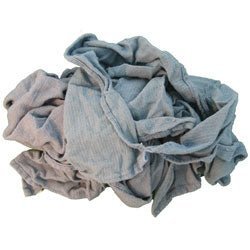Exploring the Many Uses of Huck Towels

Huck towels are far from the first thing that pops into one's mind when thinking of reliable cleaning tools. These unassuming, tight-weave cotton cloths are, quite literally, a hidden gem. Used in everything from manufacturing and medical facilities to salons and food service, huck towels are tough, highly absorbent, and even lint-free. Whether it is the health industry, the hospitality one, or merely an upgrade needed for cleaning appliances at your home, a Huck towel should be something closer to consideration. This blog will shed light upon its history, peculiar characteristics, and areas where it applies.
What Are Huck Towels?
Huck towels are made of 100% cotton, but they have a particular weave. The term "huck" refers to the pattern in the weave, which gives the towel surface a somewhat textured nature, allowing the towel to pick up moisture and dirt easily. They were originally designed for hospitals to clean up before surgery and therefore were also known as "surgical towels." Their quality was so good that they slowly gained acceptance in other fields too.
Key features of huck towels include:
-
High Absorbency: The tight weave of the cotton fibers allows for maximum absorption.
-
Lint-Free Cleaning: Unlike many other cloths, huck towels leave no residue, making them ideal for sensitive cleaning tasks.
-
Durability: These towels can withstand repeated washes and heavy-duty use.
-
Eco-Friendly: Being reusable and biodegradable, huck towels are a sustainable alternative to disposable cleaning wipes.
A Brief History of Huck Towels
Huck towels first originated in Europe, where this special weave pattern was first developed. The term "huck" is thought to have come from "huckaback," the name for a very popular textile throughout the 18th and 19th centuries. Huck towels began to find their way into the United States medical field because of their lint-free, sterile-friendly nature. People realized how versatile they were and found them working their way into homes, restaurants, and even car garages.
Common Uses of Huck Towels
Their versatility has made huck towels a very common sight in many places. Following are some of the most common uses of huck towels:
-
Healthcare: Huck towels have become an indispensable part of any hospital and clinic. Because they are lint-free, they do not leave their fibers behind, which makes them very vital during surgical operations and cleaning of delicate medical equipment. Moreover, since they can bear high-temperature washing, they are readily sterilized.
-
Janitorial and Cleaning Services: Professional cleaning companies often rely on huck towels for tasks that require precision and thoroughness. From wiping down glass surfaces to cleaning electronics, these towels perform exceptionally well without leaving streaks or lint.
-
Automotive Industry: In auto detailing, huck towels are used to clean and polish the interior and exterior of cars. The soft yet resilient texture makes them perfect for removing grease and grime from sensitive surfaces without scratching them.
-
Food and Beverage Industry: Restaurants and bars apply huck towels to a wide range of purposes, including cleaning tables, countertops, and kitchen equipment. Their high absorbency helps to handle spills more quickly and avoid any kind of residue left behind on glassware.
-
Household Cleaning: For a homeowner, huck towels are a game-changer. Whether dusting furniture, cleaning mirrors, or wiping up spills, these towels outperform the alternatives. They are especially great for cleaning windows, leaving them spotless and free of streaks.
-
DIY and Crafts: For crafters and DIYers, huck towels are also a favorite because of their absorbency and toughness. They're great for wiping brushes, cleaning surfaces, or even as makeshift drop cloths during painting projects.
Advantages Over Traditional Cleaning Cloths
Huck towels have several advantages over other cleaning materials, such as paper towels or microfiber cloths:
-
Cost-Effective: While the initial investment may be higher than disposable options, their reusability makes them more economical in the long run.
-
Environmentally Friendly: Unlike paper towels, which contribute to waste, huck towels can be washed and reused multiple times.
-
Versatility: Huck towels can handle a wide range of cleaning tasks, making them a one-size-fits-all solution.
-
Professional-Grade Performance: Their lint-free nature and durability make them the preferred choice in professional settings.
Caring for Your Huck Towels
To maximize the lifespan of your huck towels, proper care is essential. Here are some tips:
-
Wash Regularly: Clean your towels after each use to maintain hygiene and absorbency.
-
Use Mild Detergents: Avoid harsh chemicals that can weaken the cotton fibers over time.
-
Avoid Fabric Softeners: These can leave a residue that diminishes the towels’ absorbency.
-
Air Dry or Tumble Dry on Low: High heat can cause shrinkage and reduce the durability of the towels.
Where to Buy Huck Towels
Huck towels can be ordered online at WipingRagWorld.com with ease through online retailers, janitorial supply companies, and specialty stores. When purchasing, find 100% cotton towels for the best performance. They usually come in bulk lots, which is economic enough for personal and professional purposes.
Conclusion
The Huck towels are never flashy, but all the talk is in their performance. Be it some major cleaning or simply wiping a surface, these towels do it with much ease and efficiency. Their durability, lint-free nature, and eco-friendliness make them a standout choice for anyone in search of reliable means to cleaning.
By incorporating huck towels into your routine, you're not only investing in a superior cleaning tool, but you're taking the step towards sustainability and cost savings in the process. So, next time you stock up on cleaning supplies, be sure not to pass these beauties by-you won't know how you lived without them.
